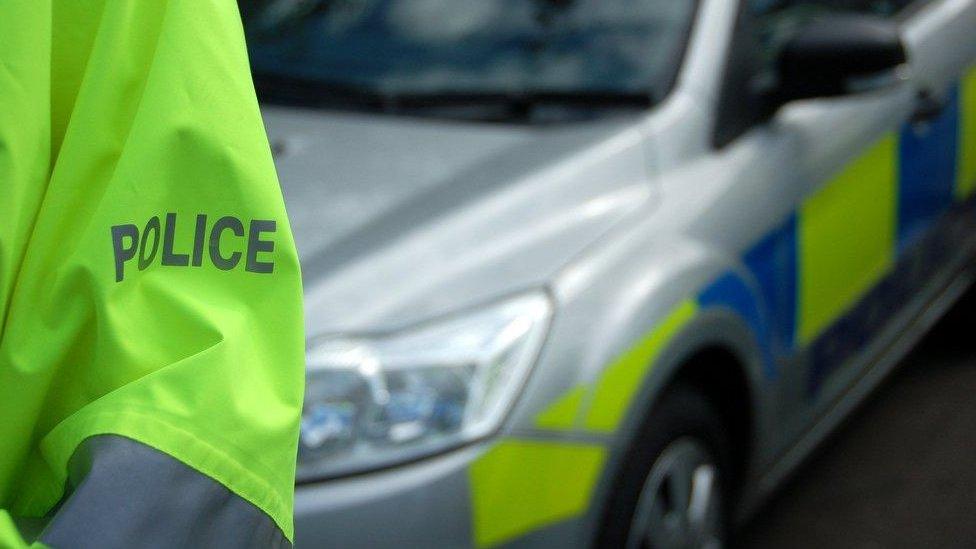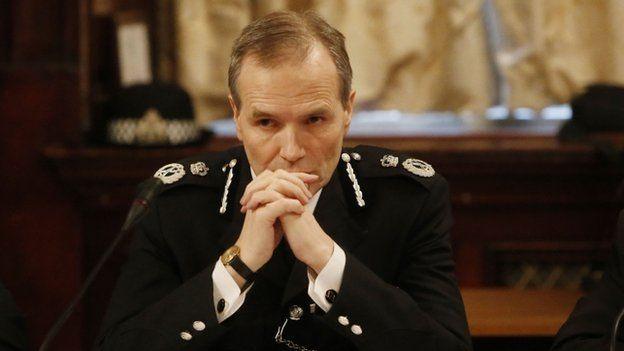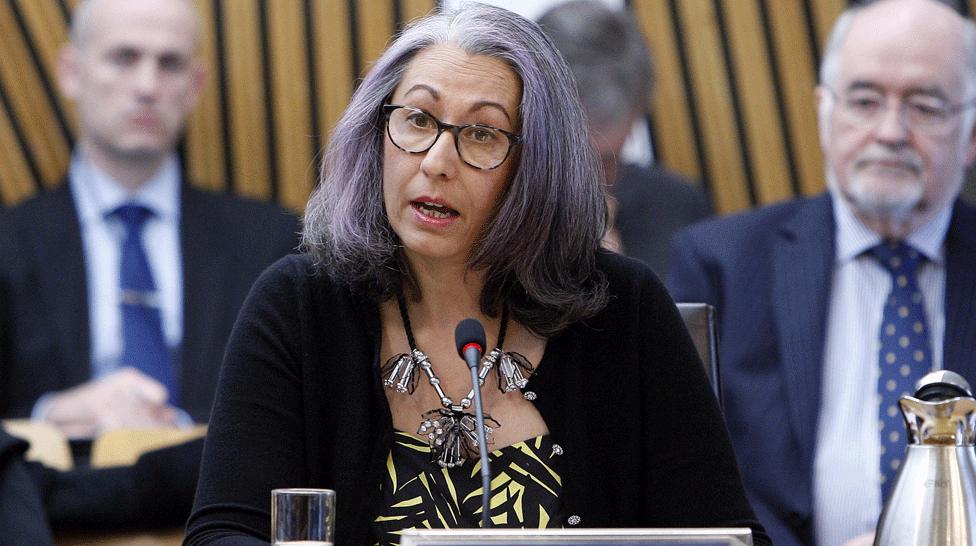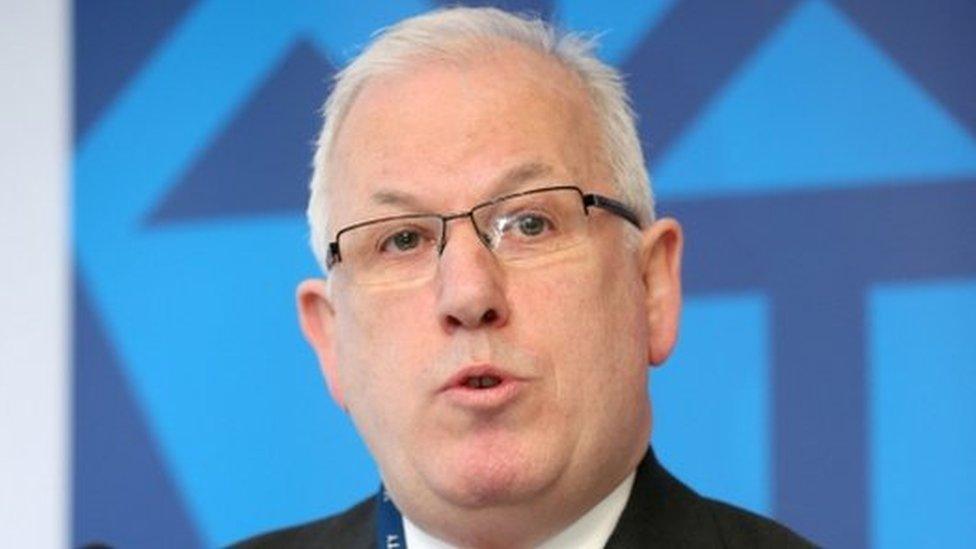Scottish Police Authority: A turbulent beginning
- Published

A single police force for Scotland became operational in April 2013
In May this year, an under-pressure Andrew Flanagan told a committee of MSPs that "now was not the time" for him to step down as chairman of the Scottish Police Authority.
He was the boss of a watchdog still in its infancy and somewhat scarred by a difficult birth.
It came into being on April fools' day, 2013 - the same day Scotland's single police service began operating.
The journey to replacing the country's eight regional forces, the Scottish Crime and Drug Enforcement Agency and the Scottish Police Services Authority was long and fraught with problems.
MSPs had put on record their concerns that control of policing had been taken out of the hands of locally elected councillors and transferred to a board appointed by Scottish ministers.
Putting the politics aside, the principal job of the 11-member plus Scottish Police Authority was simple - hold the new Police Scotland and its chief constable to account.
The SPA did not have the start it might have wished for.
Its first chairman, Vic Emery, got into a number of public spats with the first chief constable of the new police service, Sir Stephen House.
For both men, the job was huge - they were in charge of newly created organisations which in turn were in charge of more than 17,000 officers, 6,000 civilian staff and had an annual budget of £1bn.
Crucially they had to see through a small revolution in the way policing was done in Scotland.

Sir Stephen House was the first Police Scotland chief constable
In August 2014, a little over four months into the life of the SPA and Police Scotland, Mr Emery spoke of his dissatisfaction at not being consulted about armed officers on routine patrol across Scotland.
He told Holyrood's Justice Sub-Committee on Policing that it was time to "move on to a situation where we are consulted in advance of policy decisions being made, rather than simply scrutinising those decisions after the fact".
It was telling that he needed to reassure MSPs that the SPA "had a growing improvement in our relationship with the police" and "we are maturing that relationship".
However, there were two key areas of disagreement which never really went away - on saving money, and on trimming staff without trimming the service.
In September 2015, Mr Emery stepped down after deciding not to seek an extension to his contract.
He knew by then that Sir Stephen was also scheduled to depart.
At the moment of leaving, Mr Emery's tone was magnanimous, saying that Police Scotland's first chief constable had been the right person "to drive through a period of massive change", external.

A single police service for Scotland
1 April, 2013 - Police Scotland and Scottish Police Authority (SPA) begin work
September 2015 - Vic Emery, first chairman of the SPA, steps down
September 2015 - Andrew Flanagan, second chairman of the SPA, takes charge
December 2015 - Sir Stephen House, first chief constable, steps down
January 2017 - Philip Gormley takes charge as the second chief constable of the single Scottish police service

So step forward Mr Flanagan, whose impressive CV was peppered with private, public and voluntary sector jobs.
The Glasgow University accountancy graduate began his working life at Touche Ross in 1976, moving on to PwC.
He did stints in Brussels and London before returning to Glasgow to become finance director at Scottish Television (STV).
In 1996, Mr Flanagan went on to take the reins at the broadcaster, known at that time as SMG plc.
His decision to resign after 10 years in the job came as a surprise, external to the company's staff and the rest of the Scottish media.
By December 2015, Police Scotland and the SPA were about to write a fresh chapter.
The SPA now had Mr Flanagan, and in his role as chairman he had helped to chose the service's new chief constable Phil Gormley.

Moi Ali resigned after Mr Flanagan criticised the way she had voiced opposition to the cutting of public meetings
It was meant to mark the start of a settled period.
However, a series of bad headlines began plaguing the 60-year-old.
Played out in the committee rooms of the Scottish Parliament, the public was told that MSPs 'do not have confidence' in the police board chief and that MSPs had been told the chairman was 'not fit to continue'.
Mr Flanagan was criticised for a lack of transparency in the way he had been running the authority.
One board member, Moi Ali, resigned after she had voiced opposition to the chairman's plans to cut the number of meetings held in public.
She said Mr Flanagan had told her that expressing disagreement publicly was a resignation matter, and told MSPs that her "removal from the board was straightforward punishment for speaking out".
There were also critical reports to contend with. The auditor general, Caroline Gardner, said she had again found "substantial issues" during her examination of the Scottish Police Authority (SPA) accounts.
'There is more I got right'
However, board members defended their chairman and the authority, with Iain Whyte characterising the SPA as "an improving board and an improving organisation".
Mr Flanagan was also willing to defend himself in the face of mounting calls for him to go.
Appearing before the justice sub-committee on policing on 18 May, he said he had reflected on the criticism and had acknowledged "my recent mistakes".
But he went on to say: "I believe there is more that I have got right than I have got wrong, on strategy, on clarity and control, on refreshed leadership for policing and on many other aspects."
Andrew Flanagan said he did not want to be a distraction
And his justification for wanting to keep the job?
"Policing is in a much better position than it was, but there is still a huge amount to do," he said.
"I believe now is not the time for yet another change of leadership in what will be a pivotal and challenging next three years for policing in Scotland."
Despite his public commitment, the clouds of discontent would not move on.
Scottish Conservative justice spokesman Douglas Ross did not shift from his position that Mr Flanagan's time must "surely be up".
Following the SPA chairman's defiant committee appearance, Mr Ross said: "Today's developments have done nothing to improve his reputation or restore confidence in the SPA."
And so, scroll forward almost a month and Mr Flanagan has announced his decision to go.
In a letter to the justice secretary, Michael Matheson, he said he would step down to avoid being a "distraction" to the new 10-year policing strategy.
He told the BBC that he had become the story and that took away from the "work of the SPA and policing more generally".
Mr Flanagan will remain in post until his successor is found.
And that appointment will mark the next chapter in the story of the authority's young and so far turbulent life.
- Published14 June 2017
